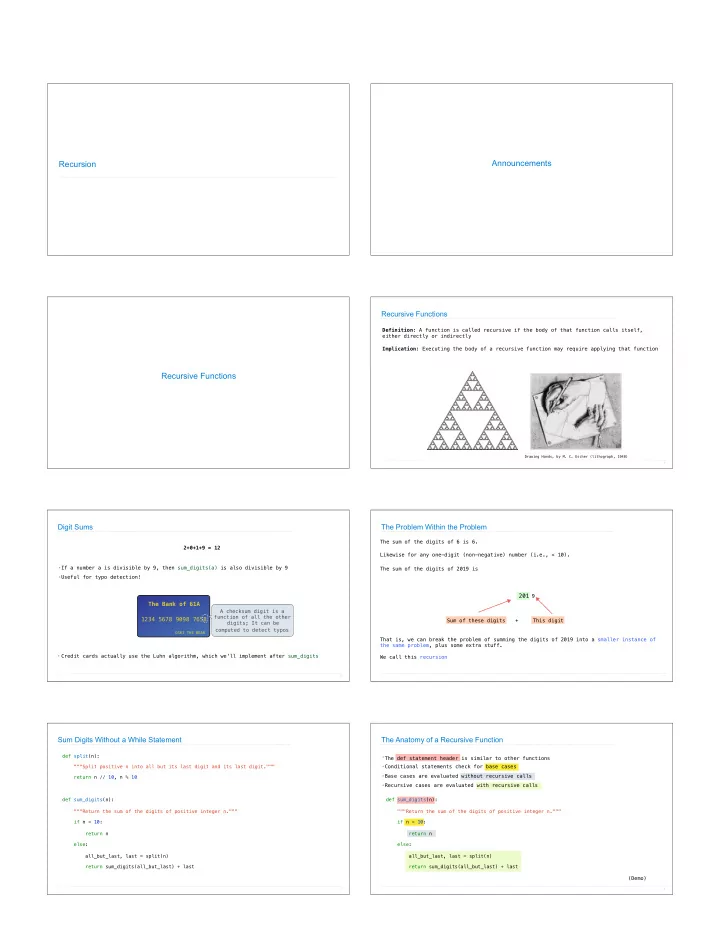

Announcements Recursion Recursive Functions Definition : A function is called recursive if the body of that function calls itself, either directly or indirectly Implication : Executing the body of a recursive function may require applying that function Recursive Functions Drawing Hands, by M. C. Escher (lithograph, 1948) � 4 Digit Sums The Problem Within the Problem The sum of the digits of 6 is 6. 2+0+1+9 = 12 Likewise for any one-digit (non-negative) number (i.e., < 10). • If a number a is divisible by 9, then sum_digits(a) is also divisible by 9 The sum of the digits of 2019 is • Useful for typo detection! 201 9 The Bank of 61A A checksum digit is a function of all the other 1234 5678 9098 7658 Sum of these digits + This digit digits; It can be computed to detect typos OSKI THE BEAR That is, we can break the problem of summing the digits of 2019 into a smaller instance of the same problem, plus some extra stuff. • Credit cards actually use the Luhn algorithm, which we'll implement after sum_digits We call this recursion � 5 � 6 Sum Digits Without a While Statement The Anatomy of a Recursive Function def split(n): • The def statement header is similar to other functions • Conditional statements check for base cases """Split positive n into all but its last digit and its last digit.""" • Base cases are evaluated without recursive calls return n // 10, n % 10 • Recursive cases are evaluated with recursive calls def sum_digits(n): def sum_digits(n): """Return the sum of the digits of positive integer n.""" """Return the sum of the digits of positive integer n.""" if n < 10: if n < 10: return n return n else: else: all_but_last, last = split(n) all_but_last, last = split(n) return sum_digits(all_but_last) + last return sum_digits(all_but_last) + last (Demo) � 7 � 8
Recursion in Environment Diagrams (Demo) Recursion in Environment Diagrams • The same function fact is called multiple times • Different frames keep track of the different arguments in each call • What n evaluates to depends upon the current environment • Each call to fact solves a simpler problem than the last: smaller n � 10 http://pythontutor.com/composingprograms.html#code=def%20fact%28n%29%3A%0A%20%20%20%20if%20n%20%3D%3D%200%3A%0A%20%20%20%20%20%20%20%20return%201%0A%20%20%20%20else%3A%0A%20%20%20%20%20%20%20%20return%20n%20*%20fact%28n%20-%201%29%0A%20%20%20%20%20%20%20%20%0Afact%283%29&cumulative=true&curInstr=0&mode=display&origin=composingprograms.js&py=3&rawInputLstJSON=%5B%5D Iteration vs Recursion Iteration is a special case of recursion 4! = 4 · 3 · 2 · 1 = 24 Using while: Using recursion: Verifying Recursive Functions def fact_iter (n): def fact (n): total, k = 1 , 1 if n == 0 : while k <= n: return 1 total, k = total*k, k+ 1 else : return total return n * fact(n- 1 ) n ( 1 if n = 0 Y Math: n ! = k n ! = n · ( n − 1)! otherwise k =1 Names: n, total, k, fact_iter n, fact � 11 The Recursive Leap of Faith def fact ( n ): if n == 0 : return 1 else : return n * fact(n-1) Mutual Recursion Is fact implemented correctly? 1. Verify the base case 2. Treat fact as a functional abstraction! 3. Assume that fact ( n -1) is correct 4. Verify that fact ( n ) is correct Photo by Kevin Lee, Preikestolen, Norway � 13 The Luhn Algorithm Used to verify credit card numbers From Wikipedia: http://en.wikipedia.org/wiki/Luhn_algorithm • First: From the rightmost digit, which is the check digit, moving left, double the value of every second digit; if product of this doubling operation is greater than 9 (e.g., 7 * 2 = 14), then sum the digits of the products (e.g., 10: 1 + 0 = 1, 14: 1 + 4 = 5) Recursion and Iteration • Second: Take the sum of all the digits 1 3 8 7 4 3 = 30 2 3 1+6=7 7 8 3 The Luhn sum of a valid credit card number is a multiple of 10 (Demo) � 15
Converting Recursion to Iteration Converting Iteration to Recursion Can be tricky: Iteration is a special case of recursion. More formulaic: Iteration is a special case of recursion. Idea: Figure out what state must be maintained by the iterative function. Idea: The state of an iteration can be passed as arguments. def sum_digits_iter(n): def sum_digits(n): digit_sum = 0 while n > 0: """Return the sum of the digits of positive integer n.""" n, last = split(n) digit_sum = digit_sum + last Updates via assignment become... if n < 10: return digit_sum return n else: def sum_digits_rec(n, digit_sum): all_but_last, last = split(n) if n == 0: return digit_sum ...arguments to a recursive call return sum_digits(all_but_last) + last A partial sum else: n, last = split(n) What's left to sum return sum_digits_rec(n, digit_sum + last) (Demo) � 17 � 18
Recommend
More recommend